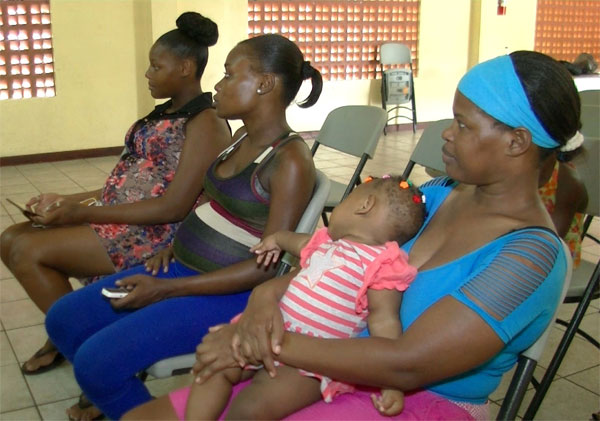
“BREAST is Best” is the message the nursing and nutrition departments of the Ministry of Health and Wellness continue to drive home to pregnant women and nursing mothers.
Exclusive breast-feeding of a baby for at least the first six months is being promoted as the method which is in the best interest of both the baby and mother.
Nutritional Officer Mary Anna Gaspard-Phillip stated when other foods are introduced too early to the babies it can adversely affect their growth and development.
“The breast milk has all the properties, all the nutrients in the right amounts and so it goes without saying that breast is best for the infant because it was meant for the baby. And by extension, it has benefits for the mother, which helps the mother to feel better. It helps her uterus to contract so she can regain her normal size. It has benefits to the mother as well in terms of bonding.”
The Nutritional Officer notes that a tighter bond is created between mother and baby during breast-feeding as opposed to being bottle-fed which has psychological benefits for the baby as well. Breast milk has antibodies which help protect babies from many illnesses. It also contains fatty acids which help babies’ brains and eyes to develop properly. Breast milk also lowers the risk of Sudden Infant Death Syndrome (SIDS), which is the unexplained sudden death of a baby under one year of age.

Gaspard-Phillip said: “Research has found that breast-feeding has a number of benefits for both the mother and the baby and by extension the family as well because when you think of buying infant formula there is a cost. When you look at the family and the income per family, the money that is spent on infant formula can very well be spent on other foods and other areas to take care of the family.”
Phillip indicated that 15 – 20% of the average household income can be spent in purchasing baby formula during the first six months of a baby’s life which is a huge cost when compared to exclusive breast-feeding.
“The breast milk is always ready, it is at the right temperature, it is cheap, it has all the antibodies which would protect the baby from all the childhood infections .The young mothers tend to shy away from breast-feeding because one of the main reasons is that their breasts are going to sag. And we try to educate them and show them that it is not because of breast-feeding the breast sags. As long as the breast is properly supported with the right bras throughout the pregnancy there is no reason why the breast muscles should sag.”
The exclusive breast-feeding sensitization workshop was conducted at the Entrepot Wellness Centre as part of activities in recognition of World Breast Feeding Week, August 1 – 7.
Family Nurse Practitioner, Mary Joseph-Sydney notes, though there is a heightened awareness among the general population about exclusive breast feeding there is still not enough adherence by mothers.

“In the Saint Lucian context a lot of people believe that I can give my child water or I can give a little toloman or something. And we are finding a lot of mothers, yes we, are finding persons still practising exclusive breast-feeding. However, a few persons are still introducing water and various liquids to their children even while they are new-borns.”
Nurse Sydney spoke of the number of other benefits exclusive breast-feeding provides to the new-born, mother and the society.
“Exclusive breast-feeding really brings out a healthy child who can be productive in society and that is why we are here to really reinforce the importance of exclusive breast-feeding in the communities.”
Sydney reported that common among babies not exclusively breast-fed are skin rash, eczema, diarrhrea, the common cold, infections of the throat, which can affect the stomach and growth of the child. Most of these conditions do not occur when children are exclusively breastfed for the first six months of their life.
She said: “We really want them to understand that exclusive breast-feeding not only helps the physical aspect of the child to grow adequately, however, the child’s brain, we call the cognitive function of the child is much improved in children who are breastfed. Because every property in the breast milk gets to the child in a manner that works for the child both mentally and physically not to mention the emotional aspect of breast-feeding. Because as you realize research is showing that children who are not breastfed did not have that first contact; the bonding aspect of children is missing.”
Breastfeeding workshops were conducted throughout the island by the Nursing and Nutrition Departments of the Ministry of Health with the aim of convincing more mothers to stay true to exclusive breast-feeding for at least the first six months of their child’s life.





![Simón Bolívar - Liberator of the Americas [Photo credit: Venezuelan Embassy]](https://thevoiceslu.com/wp-content/uploads/2025/12/Simon-Bolivar-feat-2-380x250.jpg)



